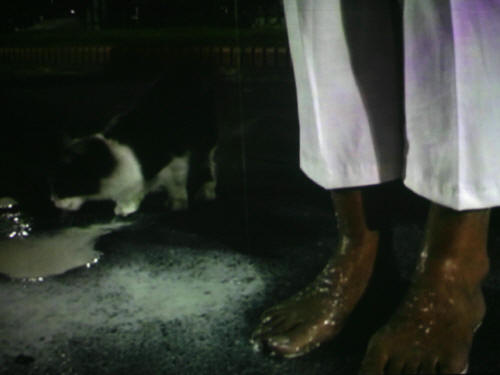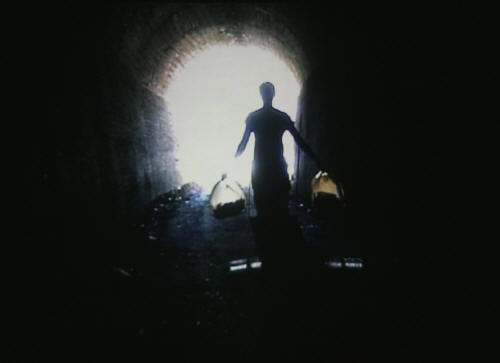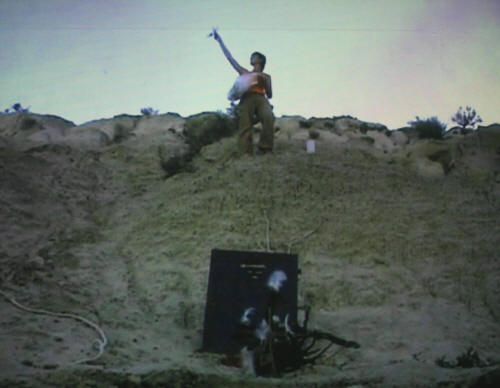|
|
| home | features | exhibitions | interviews | profiles | webprojects | gazetteer | links | archive | forum |
|
Carter and Zierle: Reflections on Patagonia The Poly, Falmouth 15th-19th April
On completing their studies at UCF, Paul Carter and Alexandra Zierle were awarded a travel scholarship which took them to Argentina, as part of the Zweig scheme. Whilst there, they made several films and performances, four of which were shown as projections in April 2008 in the large gallery at the Poly in Falmouth (image below).
Their practice as performance artists has evolved out of sculpture and installation: and despite being constructed around ritualised movement and symbolism, it remains very sculptural, and animated by the silent poetry of everyday objects. 'Spillings' is a performance film made in Buenos Aires in which Zierle is filmed walking around the mausoleum of the first president of Argentina - an imposing monument in the centre of the city - with milk spraying from two white bags in her hands (picture below top). These bags, like plump plastic breasts or udders, discharge their contents onto the dry pavement, leaving a moist white trail which is gratefully licked up by numerous stray cats. On the sound-track cars can be heard driving past the performer, together with pedestrians talking in hurried Spanish, many commenting on the action as they watch on. The circular form of the performance gives it a pleasing structure, and the generosity of the cat-feeding gives it tenderness, but it is the powerful visual impact of this dramatic nocturnal work that is most impressive, and the imagery lingers long in the mind.
'Tracing the Dragon's Tail' is also a film of Zierle performing, with Carter behind the video-camera. Again she carries plastic shopping bags in both hands. This time, however, they are in Patagonia, the bags contain feathers, and the structure of the performance is more complex. Patagonia is an ancient and mountainous region of South America, subject of a celebrated book by Bruce Chatwin, and it includes a region visited by Carter and Zierle that was once colonised by migrant Welsh miners and their families. The film opens with Zierle walking, slowly dragging behind her bottles of water, a skeletal branch and a piece of scrap metal; each attached noisily by strings to her waist (picture above). She emerges into the light from inside a disused railway tunnel, then makes what appears like a small shrine by the side of the road using these same objects. Again exquisitely filmed, the shrine, the dry sand and the feathers give the work a sepulchral or funereal quality, familiar perhaps from similar works by Ana Mendieta. Though the film has slow, mournful opening, with the walking suggestive of a slow painful journey - after Zierle has discarded her burden - it ends with a joyful image of a feather floating brightly against the blue sky. Both of the films use the South American backdrop to great effect. Carter and Zierle appear to insert their performances seamlessly into the foreign environment as they find it: a spontaneous and creative response by outsiders to their condition of 'thrownness'; to borrow Heidegger's phrase. Two other videos projected in the same space, ('Buenos Aries Bus Trip' and 'Patagonian Bus Trip') were records of journeys taken through Argentina that seemed to serve to provide an ambient counterpoint to the other films.
In an adjacent smaller room, Carter and Zierle had recreated 'Reflections on Patagonia', a work seen first at Live Art Falmouth (LAF) 2007 (two pictures above). Originally over two hours long, and performed in the same space as the audience, it had been edited down to a 40 minutes and was shown as a projected video, with the white tent marked by a deep vertical incision installed in the same space, together with a pillow and other remnants of the performance.
Interview with Carter and Zierle to follow. See 'webprojects' for films. see also exhibition_Live_Art_Falmouth.htm
|
|
|



